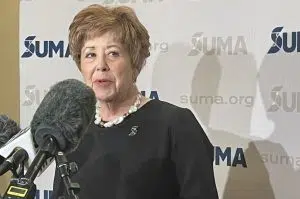On the second day of the Saskatchewan Urban Municipalities Association’s (SUMA) annual convention, issues concerning mental health and addictions in the province took the main stage.
One of the organization’s priorities this year is mental health and addictions, and the topic was repeatedly raised by speakers at the event on Monday.
Saskatchewan Premier Scott Moe touched on the problems.
The premier spoke to convention attendees in a 45-minute address that rehashed numbers showing and projecting growth in the province in areas of resources, technology and innovation.
Moe also noted some challenges Saskatchewan is facing — namely, mental health and addictions problems and property crime as a result — are areas the provincial government aimed to address in its recent budget.
Randy Goulden, SUMA’s president, said she didn’t hear everything she wanted to in the premier’s speech.

SUMA president Randy Goulden speaks to media at the annual SUMA convention, in Saskatoon, on April 17, 2023. (Libby Giesbrecht/650 CKOM)
Goulden said Moe mentioned wanting to meet with SUMA and the Saskatchewan Association of Rural Municipalities, but said she wants to see a formalized consultation protocol established to make this happen, “so we know what to expect when we’re working with (the) provincial government, and they know what to expect from our order of government.”
She said these discussions are especially crucial when it comes to concerns like mental health and addictions in the province.
“I’d really like to sit down with him, and not just me. We have 441 members of SUMA. What do they see the need is in their communities?” she asked.
Goulden said the need for mental health and addictions resources is apparent in many parts of the province, even referencing her own city, Yorkton, where there is now an emergency shelter for the first time.
Charlie Clark, mayor of Saskatoon, and Sandra Masters, mayor of Regina, both said the homelessness situation facing both cities is becoming a crisis.
Referring to Moe’s speech, Clark said urgent care facilities and treatment beds for addictions are both welcome supports, but those don’t address every concern.
“There are many gaps in between,” he noted.
Clark said supportive housing options are a necessity for people seeking treatment or care after they’ve been stabilized. Referencing Saskatoon’s emergency wellness centre, Clark said people now have a place they can go for help, but there are not many options available to help them get back on their feet over a longer period of time.
“We are calling for 100 complex-needs housing beds in Saskatoon alone,” he said.
Masters said the new urgent-care facility in Regina is more than 50 per cent complete, and about 30 per cent of its beds will be reserved for mental health and addictions treatment.
She explained that gaps in care exist, and the city is looking for ways to expand its treatment capacity. The mayor also noted funding has been allotted to purchase a permanent spot for Regina’s own wellness centre.
Masters echoed Clark’s concerns about needing to fill those gaps, saying it would be nice to connect people in a “clear, linear path to resources they need.”
Resolutions on the agenda
A total of twelve resolutions — ranging from issues like PST charged on event tickets and construction to financial relief from the federal carbon tax — are set to be debated Monday afternoon at TCU Place as part of the annual convention.
Terry Kostyna, mayor of the Resort Village of Candle Lake, was pushing for a unique transportation option to be made available in Saskatchewan communities: golf carts.
He said his municipality is not alone in wanting golf carts to be allowed on municipal roadways.
The move could help provide greater mobility to individuals who might otherwise not be able to get around in a way that meets their needs, Kostyna and Goulden both suggested.
“This would not mean that golf carts would be allowed automatically on every road in Saskatchewan. We’ll decide what’s best for our communities,” Kostyna said.
He explained that help would be needed from the province in the form of legislation, and acknowledged some restrictions might be necessary for safety reasons, like requiring some form of licence or insurance in order to operate a golf cart on the road.
Kostyna said communities should be able to decide for themselves whether they want to make such allowances, and should be able to set regulations that make sense for that municipality. For Candle Lake, Kostyna suggested use could be limited to certain neighbourhoods or roadways.
“We’re all very smart communities in Saskatchewan,” Kostyna said. “We can make up our own rules as they pertain to our communities.”
Goulden said she’s heard from mayors other than Kostyna who are in support of such a resolution, and said it would help “to get some of their residents that aren’t that mobile to even collect their mail.”
Jim Gallant, a SUMA board member as well as a councillor and member of the volunteer fire department in Churchbridge, spearheaded a different safety-focused resolution.
With the surge in electric vehicles on the road, Gallant said fire departments in Saskatchewan are sometimes unsure of how to deal with emergency situations involving them.
Churchbridge is located on the Yellowhead Highway, near Yorkton.
“We have a lot of accidents on the road,” Gallant explained.
While firefighters know how to navigate an emergency situation involving a gasoline-powered vehicle after a collision, Gallant it is not as clear when an electric vehicle is involved. The inclusion of a charged battery and wiring means firefighters could be shocked, severely electrocuted or even killed in an explosion, he said.
Gallant said the people he volunteers alongside are fearful of electric vehicles because of safety concerns should they become involved in a crash.
He said he wants to see a tool that can clear the charge of an electric vehicle provided to fire departments like his own so that “when there’s an incident, (firefighters are) not going to be touching a vehicle that could potentially kill them.”











